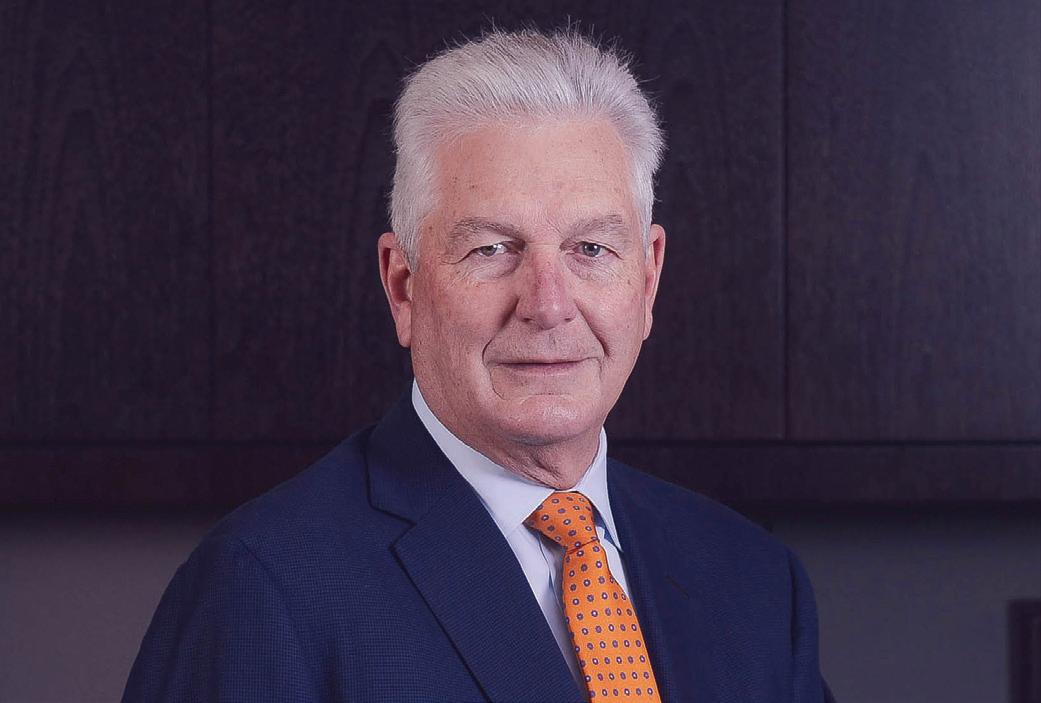
23 minute read
Shaping the Future for Excellence – Faculty Highlights
R. MILTON JOHNSON
Making Transformational Change Through Education
There are few people who better embody Belmont’s core values than R. Milton Johnson. A 1979 accounting graduate who currently serves as chair of Belmont’s Board of Trustees, Johnson is a 37-year veteran of Fortune 100 company HCA Healthcare. He retired in 2018 as CEO after serving in various financial and senior management positions for the company. While his resume would certainly be remarkable for anyone, the Milton Johnson story truly reads as a blockbuster tale. Johnson attended Nashville’s Stratford High School, working multiple jobs to help his single mom support their family. Then as a student at Nashville State Community College, he balanced the weight of a fulltime job with the stresses of completing college courses, believing education could someday catapult him into a different situation. Johnson’s hard work paid off when he was offered an academic scholarship to what was then Belmont College, paving the way to an accounting degree and rapid career advancement. From his earliest days as an alum, Johnson has remained a dedicated supporter of the University’s mission. The couple donated $10 million in 2019 to create a fund to support what is now known as the Bell Tower Scholars program, an initiative that helps to provide full scholarships to Belmont for qualified, high potential students from Metro Nashville Public Schools, including his own alma mater of Stratford High. In addition to their financial support, the Johnsons spend substantial time each year with the Scholars. Committed to “paying it forward,” giving potentially hundreds of young people an opportunity to better their situations and follow in Milton’s footsteps. “My Belmont scholarship was a life-changing experience for me,” Johnson said, “and we want other Nashville public high school graduates to have the same opportunities at Belmont. We want these students to know that Belmont believes in them—we believe in them—and there are no limits to what they can achieve in life.” More recently, the Johnsons donated an additional $10 million to Belmont, this time to benefit the University’s Thomas F. Frist, Jr. College of Medicine. Johnson said, “I’m eager to watch as the next generation of healthcare providers are trained at Belmont with a [drive like Tommy’s] to serve and care for patients, families and communities.” Retired Belmont President Dr. Bob Fisher noted, “As an alum, [Milton] represents what Belmont is all about, truly using his education to make transformational change in the world.”


E.J. REED
Representing The Intersection Of Doing Well And Doing Good
Massey MBA alumni, serial entrepreneur and committed community member, E.J. Reed is a co-founder of Slim and Husky’s Pizza Beeria, a fast casual, artisan pizza shop chain with a love for hip-hop and R&B culture. Slim & Husky’s was founded on a shared dream inside of a garage in 2015. Reed and two friends started the gourmet pizza joint to serve unique pies and provide jobs and culture to their neighborhood in North Nashville. Since then, Slim and Husky’s has grown to 10 locations in Tennessee, Georgia and California. Massey faculty member Dr. Mark Schenkel helped with Reed’s first business, back in 2009. At that time, Reed was working full time as a financial analyst, pursuing an MBA and starting a business. Dr. Schenkel was Reed’s entrepreneurship professor, and Reed found it extremely rewarding to work on his real-life business projects in that class. According to him, it was like having access to a consulting group, and it really impacted the success of his business at that time and continues to help with the success of his businesses today. Reed also loved that the instructors all had industry experience in addition to academic credentials. For Reed, giving back is the most important thing. He wants to have a legacy of positive impact, of empowerment, of creating something meaningful. Slim and Husky’s purposefully opened the first location in the heart of Nashville’s 37208 zip code, known for having the highest incarceration rate in the U.S. He would like to bring a light of hope and a positive influence everywhere the business goes. The company is now building a national brand and helping uplift communities as they grow, providing jobs and positive attention. Reed commented, “It feels awesome to create jobs that pay livable wages in communities that really need those jobs. It has also been incredibly rewarding to open the first African American-owned restaurant on Broadway. We’re excited to expand into the heart of Nashville, representing Nashville the right way, by breaking down barriers and helping lift up others.”
Starting A Successful Business While Still In School
Like many students, Makenzie Stokel came to Belmont with a love for live music. In fact, during her freshman year she started planning house parties and small festivals with her friend, fellow Belmont student Channing Moreland. Stokel loved the music part of the business, but not the paperwork and uncertainty of booking live entertainment. She determined that there must be a more efficient way to manage the administrative side. In 2015, Stokel and Moreland formed a new business, EVA, to build an online platform to automate the process of booking entertainment. After starting the new venture, Stokel quickly realized she needed to take business classes. She added an entrepreneurship major and began to develop her business in class with the help of faculty members and other student entrepreneurs. Stokel commented, “All the Massey faculty members are so helpful, especially in the early days, Dr. Jeff Cornwall and Dr. Jose González in particular. We benefited so much from their teaching, ideas, experiences and connections. They are really open and always willing to talk and help. Massey’s small class sizes also facilitate relationships with faculty.” Further, Stokel started using Massey resources outside the classroom, particularly with the Cone Center for Entrepreneurship. In 2013, she placed third in the Massey Entrepreneur Pitch Competition. In 2014, she won the Belmont Business Plan Competition, which led to even bigger opportunities. The Business Plan judges were so impressed, they encouraged Stokel and Moreland to participate in the Nashville Entrepreneur Center’s Project Music in 2015. Stokel was offered funding for EVA in her junior year with the caveat that she and Moreland quit school. The pair decided to stay in school, wait a year to graduate and grow the business. After graduation, they raised $150,000 that they used that to invest in the EVA platform. Symbolic of EVA’s growth and development, the company’s first customers were college students. Today, EVA has only corporate clients. The business has grown in Nashville and expanded into markets around the country.
MAKENZIE STOKEL
Stokel, right, with Moreland
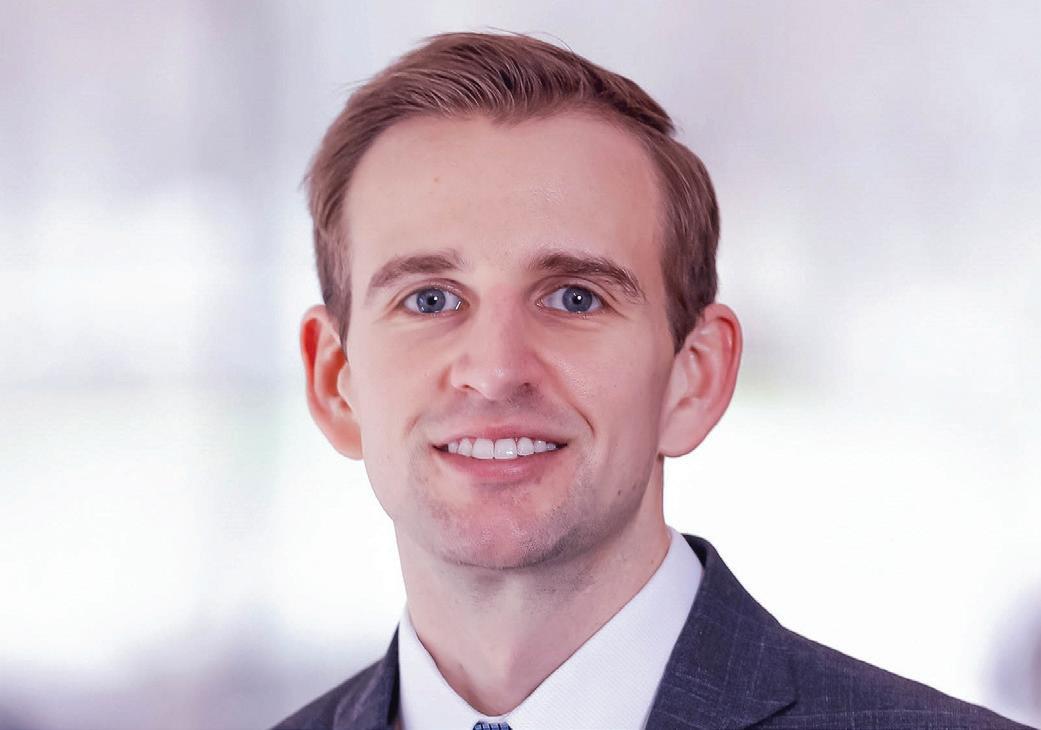
KNIGHT LANCASTER
Melding Business and Legal Education For A Game-Changing Career
In 2019, alumnus Knight Lancaster became the first student to graduate from Belmont’s joint JD/MBA program. The program enables students to complete requirements for both demanding yet high-potential degrees in just three years. Today, Lancaster spends most of his time working on mergers, acquisitions, dispositions and security law matters. Impressed by the bar passage and employment rates of Belmont Law students, Lancaster chose to enroll in the college. In his first year, Belmont announced the joint JD/MBA program, which had always been of interest to him. “Being a CPA, most attorneys I met with put me solely in a tax attorney ‘bucket,’ but I was mainly interested in focusing my taxation and accounting knowledge in the mergers & acquisitions and securities law areas.” “My hope was that Belmont’s MBA program would broaden the opportunity to put my accounting and tax knowledge to use in the mergers & acquisitions and securities law areas. Ultimately, my education helped me break through in finding the career opportunity I wanted.” He explained, “Legal advice and business advice have opposite fundamental purposes. At its core, an attorney’s primary role is to protect a business from unnecessary risk or make the business aware of risk and mitigate the same. The role of businesses is to generate a return to its shareholders, which inherently involves risk. This is the fundamental friction between business and legal objectives. The benefit of understanding both business and legal ‘languages’ at a fundamental level is that you can understand where your client is coming from and what is driving their decisions.” He also found community in the College of Business thanks to the group nature of his MBA classes. Lancaster says he is immensely grateful for his time at Belmont and the opportunities that have come with it. Currently, Lancaster is a member of the Tennessee Bar Association, Nashville Bar Association, American Institute of Certified Public Accountants and Tennessee Society of Certified Public Accountants, and sits on the board of the Young Leaders Council. “My Belmont education was a difference-maker in my career,” he noted. “My ability to see through both the accounting and legal lenses at a high level allows me to give clients balanced guidance and provide creative solutions that correspond with their financial goals and, ultimately, enable them to help a wider range of people.”
THE PROMISE OF EXCELLENCE
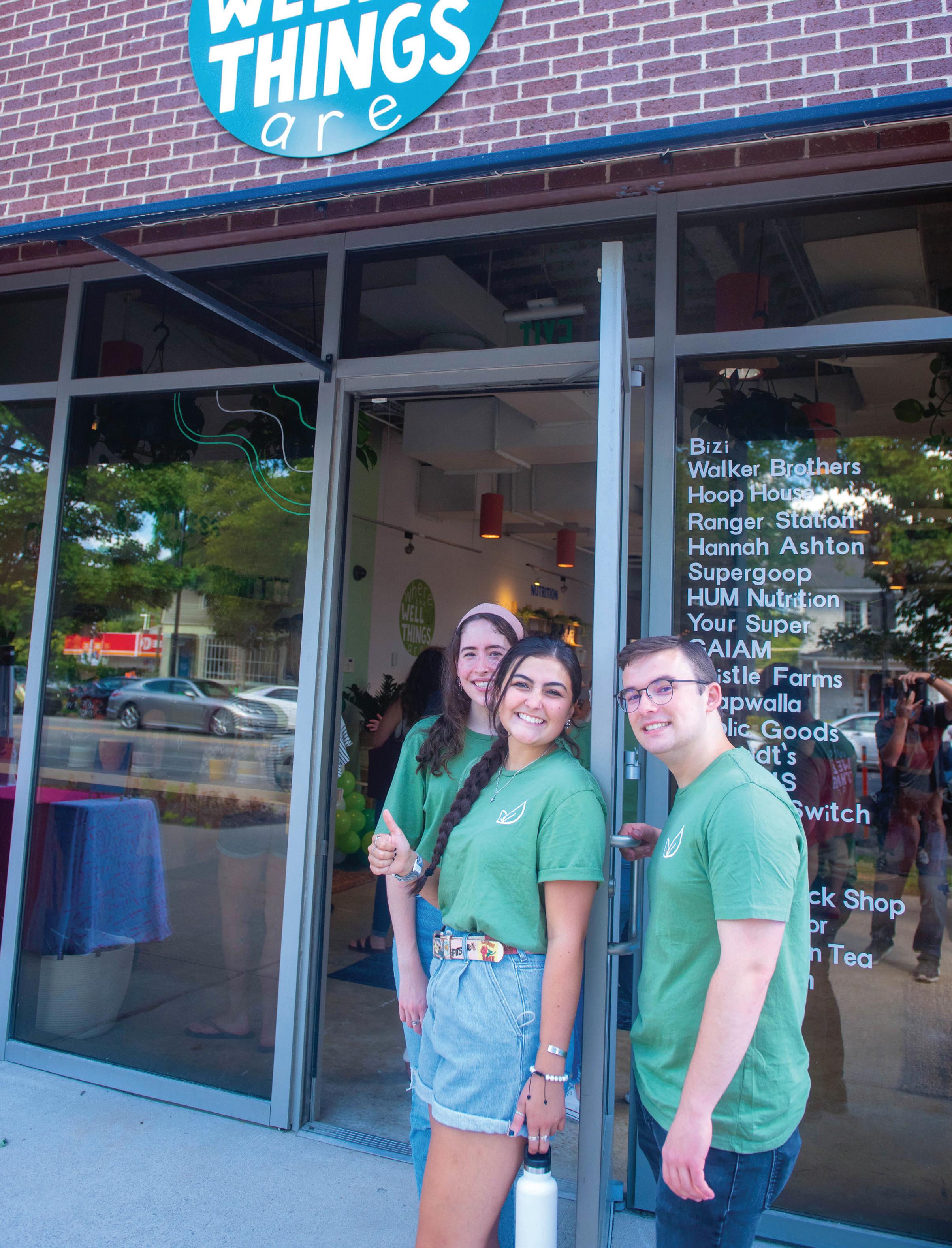
The experiences of current students and the impact seen from the Massey College Centers provide a telling glimpse of ongoing excellence in action.
The future is now. For the “Generations of Excellence” for which the Massey College has become known to continue, the college must provide today’s students with an outstanding educational experience and offer opportunities and connections that deliver exceptional value for those students, as well as for faculty, staff, corporate partners and the community at large. A business school—particularly one bearing both the Belmont and Massey names—must demonstrate its ability to impart competence and character, inspiration and innovation. From the testimonies of current students to the activities and networking fostered by our centers, it is clear that future generations are, truly, in excellent hands.
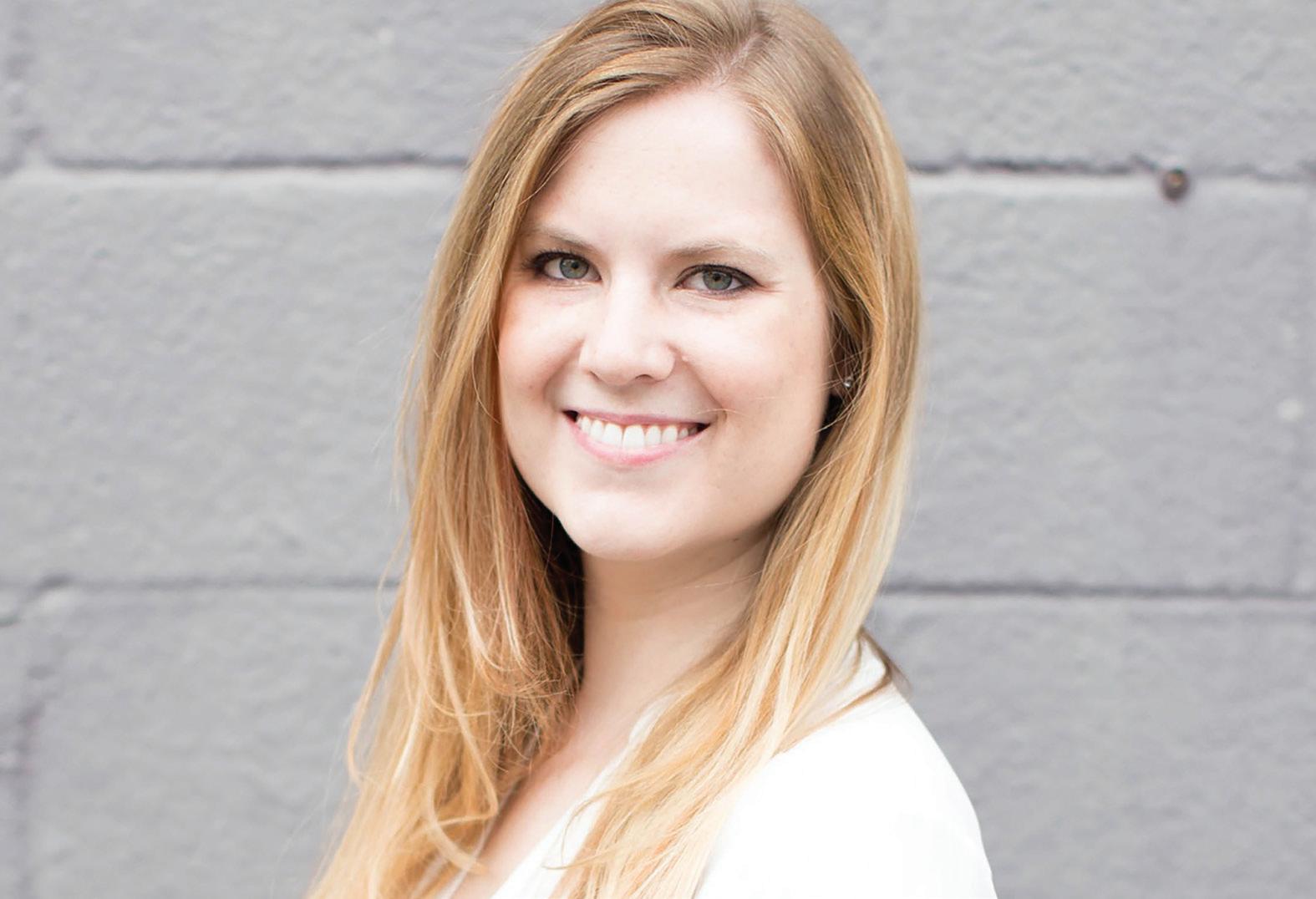
RACHEL GRESHAM
Exploring the Business of Architecture
Rachel Gresham is a graduating Professional MBA student who brought her unique background of architecture with her to the Massey College. Prior to joining the Massey family, Rachel graduated from Virginia Tech with a Professional Bachelor of Architecture in 2013. She worked for several fi rms in Virginia, then moved to Nashville to be a part of the booming construction industry in late 2016. She has been a licensed architect since 2018. Rachel’s interest in exploring work cultures is what originally brought her to the College of Business. She discovered that the concepts she loved had more to do with fi rm operations, work culture and education, and wanted to learn more about their integration with architecture to take her career to the next level. Attending Massey has allowed direct application of learned concepts and ideas to Rachel’s work where she can implement this knowledge to improve the workplace. Since living in Nashville, she has worked with TMPartners, an architectural design fi rm and has been promoted several times in the last six years. She now has prominent contributions on the business side beyond the responsibilities of an architect. While working at TMPartners, she was infl uential in creating a Mentorship and Advocacy Program, and she also co-founded a Women in Architecture Committee for the American Institute of Architects Middle Tennessee Chapter that ultimately transitioned into the Equity, Diversity and Inclusion (EDI) Committee. Recently, she took a position as lead of the Education Committee, which is responsible for helping TMPartners become an educational community where growth and learning are at the center of its practice. She also sat on the Board of Directors of The American Institute of Architects Middle Tennessee Chapter for four years. Rachel attributes much of the growth in the workplace to her Professional MBA courses at Massey. One of her favorite classes was Organizational Behavior with Dr. Amy Crook where they discussed burnout and stress management. This was especially useful during the pandemic in 2020 when Rachel began classes at Massey. She was able to implement these tactics at work as well as teach her co-workers about the concepts so they could work through it together. Massey has inspired Rachel to approach situations with a 360-degree view in a professional and personal sense. Rachel is proud of the edge that a Massey Professional MBA has added to her career and is ready to attack the next part of her life with a sense of strategy and that same 360-degree view.

AVERY McCONKEY
Leaning Into the Family Business
Entrepreneurship and fi nance double major Avery McConkey hails from Danville, Illinois and comes from a family of entrepreneurs whose ventures include Dawson Logistics, Turtle Run Golf & Banquet Center and Snapper’s Bar & Grill. Avery, an entrepreneur at heart himself with literally hundreds of business ideas, has already begun his entrepreneurial journey by founding Street Supply Jewelry & Apparel in 2020. A high school quarterback, Avery has a leadership mentality and always strives to help bring others up. He also has a love of numbers, investments and securities. His favorite classes so far have been Investment Portfolio Management with Dr. John Gonas and Foundation in Entrepreneurship with Dr. Mark Schenkel. Avery is also grateful for the relationship he has with his advisor, Dr. Jose González, and appreciates what he has learned about business law from Dr. Haskell Murray. Taking advantage of Massey resources outside of class, Avery participated in the Cone Center for Entrepreneurship Business Plan Competition and received an Excellence in Entrepreneurship Grant. During his remaining time at Belmont, Avery plans to study abroad and participate in more competitions. According to Avery, the Massey College of Business is special because faculty members really care about students and genuinely enjoy helping them be successful, both while they are here on campus and as alumni. Professors push students out of their comfort zones and help them approach problem solving from diff erent perspectives. “At Massey, you’re in for a treat with your professors, and those are relationships I will take with me for life. And down the road, I’ll give back in any way I can,” commented Avery.
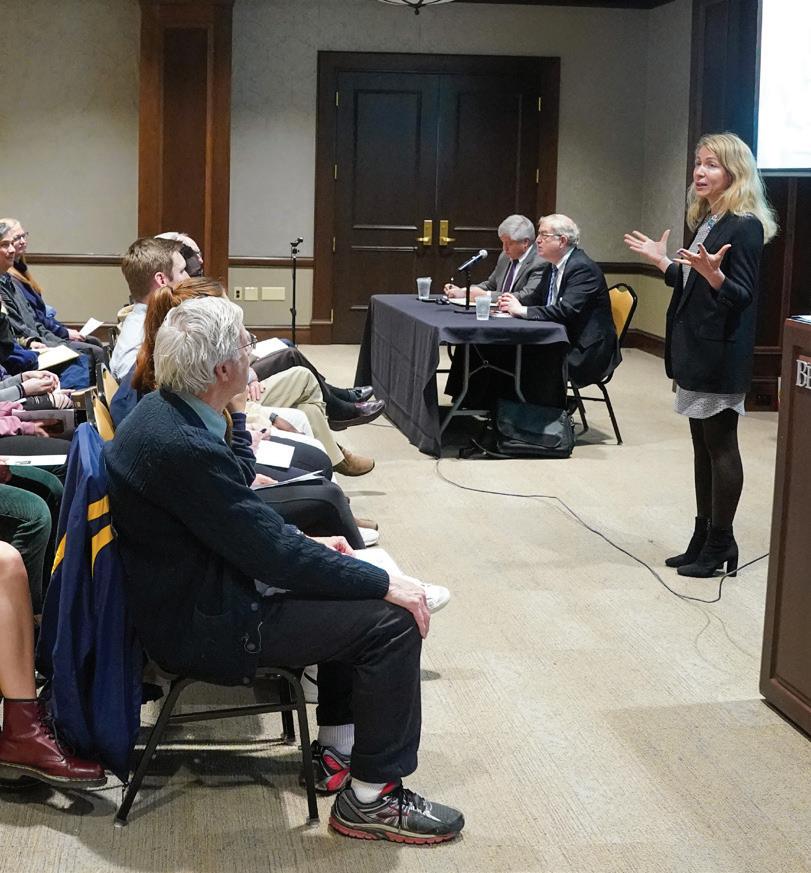
Entrepreneurship Village
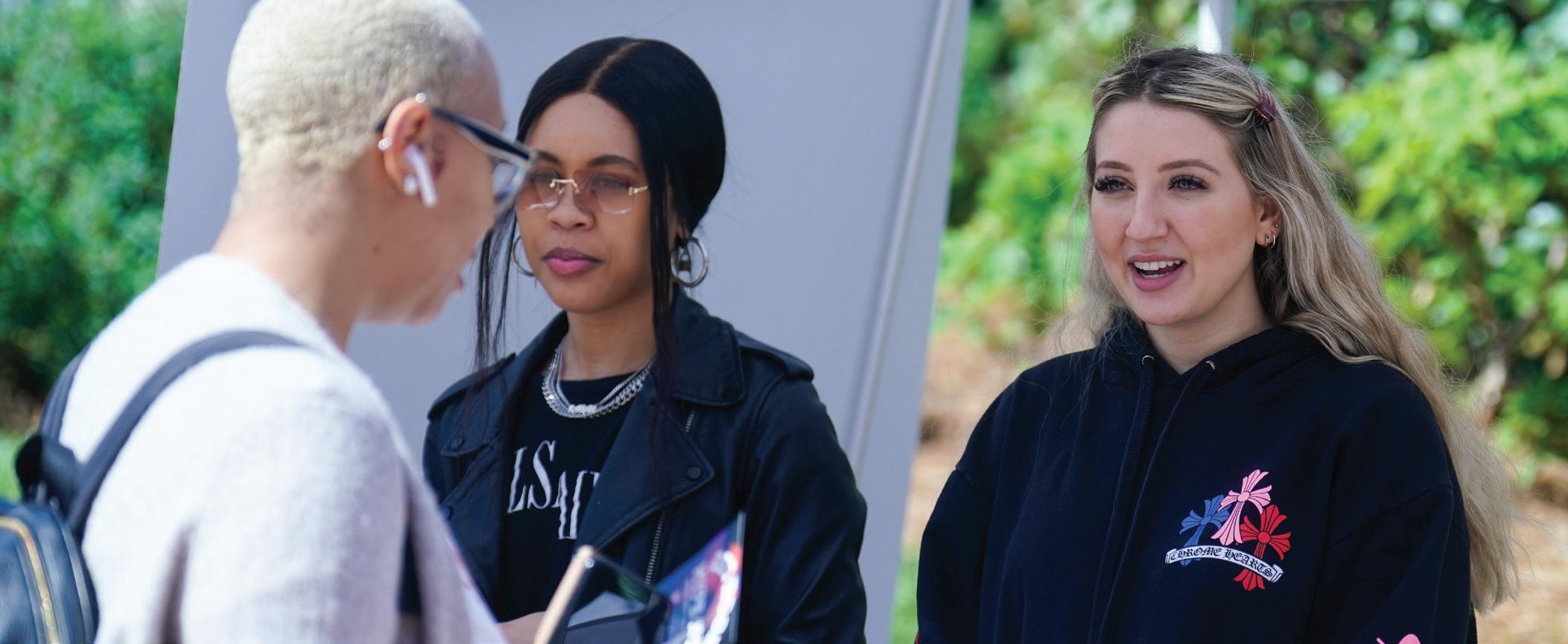
THOMAS F. CONE SR. CENTER FOR ENTREPRENEURSHIP
Entrepreneurship at Belmont began in 2003 by Dr. Jeff Cornwall with the launch of the major, minor and Center for Entrepreneurship concurrently. The Center empowers student entrepreneurs and promotes a spirit of entrepreneurship by providing resources and opportunities to create innovative, ethical and globally minded businesses. With a generous $2 million gift in 2019, the Center was named the Thomas F. Cone Sr. Center for Entrepreneurship allowing the Center to expand resources and reach with students and alumni. Consistently ranked in the Top 25 Entrepreneur Programs by Princeton Review and Entrepreneur Magazine, the Cone Center is at the forefront of entrepreneurial education. “We work with students from all majors across campus to support their entrepreneurial journey—from ideation, to launch and scaling the business” said Cone Center Executive Director, Elizabeth Gortmaker. “Our alumni have started over 800 businesses in six countries around the world.” Massey College curriculum offers a hands-on, co-curricular approach that encourages an entrepreneurial mindset in all students as they learn ethics, finance, business models, market opportunity and growth management. Recent years have seen the launch of an annual Entrepreneurship Village, to celebrate student and alumni businesses, as well as an event garnering significant attention and enthusiasm, the Top 100 Alumni Entrepreneurs Honors.

EDWARD C. KENNEDY CENTER FOR BUSINESS ETHICS
The Center for Business Ethics was founded in 1994 by Professor of Management Dr. Harry N. Hollis to further ethical practice in business. In November 2012, the Massey College of Business celebrated a generous endowment from civic leader and Belmont Trustee Helen Kennedy who named the Center of Business Ethics in honor of her late husband Edward C. Kennedy. Mr. Kennedy, also a Belmont Trustee, was widely known for his unwavering commitment to fair, honest and ethical business practices. “The Edward C. Kennedy Center for Business Ethics is an integral part of the cocurricular ethics programs offered to both Massey students and others across campus,” said Boyd Smith, Kennedy Center director. “The Center supports students’ development of moral clarity grounded in sound critical thinking and reasoning to be ethically prepared to confront the complex ethical challenges in today’s business world.” Through the Kennedy’s generous endowment, the Center continues to support business ethics endeavors outside of the classroom including hosting subject matter expert speakers, case study and essay competitions, community service projects and the Student Chapter of the Center for Public Trust (CPT). Today, the Center continues its mission to nurture conversations around business ethics, empower leaders to face current crises in business ethics and educate ethical business leaders for flourishing communities.
CENTER FOR INTERNATIONAL BUSINESS
The Center for International Business was established in 2009 after Belmont’s Massey College was awarded the first-ever Business and International Education grant from the U.S. Department of Education. The two-year grant supported the growth of international business education at Belmont and sponsored international business teaching programs for the Nashville community. Since that time, the center has continued to expand its program of offerings, with a goal to prepare students and the Nashville-area business community to make the world a better place through purpose, character and a transformational mindset.
“Our most essential role is to cultivate global mindsets across the Belmont community,” said Director Dr. Marieta Velikova. “Year after year, national survey data reveals both students and employers rank cross-cultural sensitivity and global awareness as their lowest competency. While curriculum and extra-curriculum activities including study abroad are important, global mindset is not just a skill set, it is truly a lifelong human curiosity, openness, empathy, humility and ability to walk in the shoes of the other.”
Global Town Hall conversation on “War in Europe”

BEASLEY INSTITUTE FOR FREE ENTERPRISE
Founded in 2018, Belmont’s Thomas W. Beasley Institute for Free Enterprise is a learning center committed to exploring and providing education and programming about the impact of free enterprise in American society. The Institute communicates the relationships between free enterprise, growth and economic prosperity, fosters the ideals of ethical and moral behavior in a system of free enterprise and highlights the roles therein of rule of law, democratic governance and competitive markets. The Institute’s $2 million dollar endowment in the Massey College supports the study of the free enterprise system, provides support for an Institute director and sponsorship of business-minded student organizations. “The Thomas W. Beasley Center for Free Enterprise aspires to become a global thought leader in free enterprise education and scholarship with a strong emphasis on student and community engagement in order to cultivate flourishing communities,” said Beasley Center Director Dr. Howard Cochran. “Our steadfast defense of the free enterprise system is founded on competition and free markets, better life and opportunities, individual and social responsibility, character with purpose and economic freedom with abundance for all.”
EXECUTIVE LEARNING NETWORK
The Executive Learning Network (ELN) is an innovative program created as an avenue for Nashville’s best-run companies to learn from each other as well as from world class speakers through an annual leadership development series. In 1990, Clayton McWhorter, then Chairman and President of HealthTrust, and Bill Trout, then President of Belmont University, started the planning for shared experiences through learning networks and the Peer Learning Network (PLN) was born. With a grant from HealthTrust, the Peer Learning Network was initially projected for a two-year run, with 12 company members. Now 32 years later their initial plans have turned into a legacy of learning that continues to flourish wth over 40 corporate and nonprofit members, and over 450 executive learners in 2022. It’s been said that “the most powerful factors in the world are clear ideas in the minds of energetic men of good will.” Executive Learning Network reflects this sentiment with educating over 4,000 executives and presenting over 250 sessions throughout its history on campus.

While we take legitimate pride in celebrating Massey’s past 50 years, it is also important to imagine the coming decades and take stock of how we are poised for the future. While much is unknown, we can agree that the velocity of change will require agility, innovation and courage. What prevailing themes will characterize our future? And what are the signs that Massey is preparing for them? Here are a few thoughts.
TECHNOLOGY AND DATA UBIQUITY
We are living the marvels—and perils—of increasing technological sophistication every day. Future business success will require data literacy and fl uency, and Massey is already pursuing the following initiatives: • Expanding content in business systems and analytics, including data manipulation and visualization, predictive analytics and cyber security. • Increasing data profi ciency across all majors, e.g., digital marketing strategies, quantitative fi nancial and economic modeling and supply chain analytics. • Engaging co-curricular opportunities, such as hackathons in collaboration with the Belmont Data Collaborative, so students can apply data-driven problem solving in relevant, realistic contexts.

LIFE-LONG LEARNING
The speed of change will also require true life-long learning. It is impossible for college graduates to know everything they will need throughout their careers, and organizations to increase knowledge acquisition and upskilling. Educational institutions must disregard “graduation” as the endgame. We must engage and retain our students throughout their careers with refreshed content, including degree and non-degree options. Just-in-time and targeted learning options will be “stacked” over a lifetime and more conveniently delivered to working professionals. Massey is already going there, collaborating on a Belmont infrastructure to support non-degree learning in the form of certifi cates, competencies and badges while also partnering with Metro Nashville organizations to assess needs and strategically determine opportunities in continuing education.
MIXED MODALITIES AND THE REDEFINED CLASSROOM
Belmont has built its reputation on classroom environments where student-to-student and student-to-faculty interactions fl ourish. However, the future includes an explosion of educational modalities that will further enhance and complement in-person learning. Our faculty will need to be profi cient in a variety of multi-modal delivery models, where the classroom is unbound by time and space and each student will have his/her own customized learning pathway. Yet, the need for teachers to guide, mentor, encourage, debate and provide nuance and context will be more important than ever. Information will be the commodity, but students’ journeys from knowledge to skill mastery to wisdom is a far higher bar that will benefi t from social interactions. Massey is moving toward that future in a number of concrete ways: • Investing in faculty development and training for the use of technology in the classroom and technology as the classroom and creating digital learning environments that mirror the business environment. • Diving into the challenges of multi-modal learning, exploring student engagement in virtual environments and matching student needs with emerging learning tools. • Discerning how to expand the classroom experience while maintaining the rich faculty-student relationships that are core to learning and to Massey’s DNA.
MORE PLAYLISTS, FEWER SILOS
We are already seeing the “deconstruction” of graduate degrees into stackable certifi cates and the just-in-time needs of working professionals. The natural extension of that trend into undergraduate programs seems likely, resulting in more fl exible scheduling for students (coursework “playlists” rather than the more rigid “vinyl” of degree plans) and “sampling” classes or certifi cates across the disciplinary silos. The future will require more interdisciplinary studies, including educational pathways that are customized to solving societal problems. To that end, Massey is already experimenting with joint graduate and compressed (3+1) undergraduate/graduate degrees. In addition, early-stage discussions have targeted the intersection of the arts, digital design and communication, marketing and entrepreneurship. This emerging skill set increasingly appears in industry demand, and it would benefi t from the partnership of multiple colleges at Belmont. In sum, Massey has begun to address many emerging educational challenges, even as we double-down on what we have traditionally done well—empowering students with an entrepreneurial mindset and a strong sense of purpose. To be sure, our next 50 years are full of change, promise and opportunity. Join us on the journey!
SUPPORTING EXCELLENCE
You Are Invited To Be A Part Of The Massey College’s Next 50 Years
Achieving this vision for the Massey College in our next 50 years will require support, and our alumni and friends’ gifts of time, talent and treasure are the “plus factors” that will allow us to make a God-sized impact on students, the Nashville community and the world. This is an invitation to join us in pursuit of that vision. We encourage you to consider the following opportunities.
ALUMNI ENGAGEMENT
It all starts with connectivity—Massey to our alumni and our alumni to each other. We need to track, engage and communicate with alums who will walk with and support us. Massey has launched Alumni Fire, an opt-in, intuitive website for this purpose. In addition to connecting the alumni community, participants can specify the exact type and level of Massey engagement they desire, as well as create unique sub-communities. To get started, visit belmontmassey.alumnifi re.com.
COMMUNITY PARTNERS
Our students and faculty are actively engaged with the for-profi t and non profi t communities in Nashville: creating meaningful internships and student employment; bringing leaders into our classrooms; developing “live cases” for real world, hands-on student applications; and collaborating on social entrepreneurship to build stronger, fl ourishing communities in the Metro area. If your organization would like to engage in ways that are win-win-win for students, your fi rm and the community, please contact Jill Robinson, Assistant Dean for External Relations and Strategic Partnerships, at jill.robinson@belmont.edu.
THE $50 FOR THE 50TH CHALLENGE
Did you know that the average percentage of alumni giving to private universities is a mere 8%, though top universities have a giving rate of more than 40%? Would it surprise you that the percentage of Belmont alumni annual giving is at that 8% average? We can do so much better. Here is a challenge: each Massey alumnus will donate $50 to our annual giving fund in this anniversary year and commit to the habit of annual giving. Thousands of smaller gifts truly make a diff erence. To make your donation, visit give.belmont.edu.
THE 50TH ANNIVERSARY CAMPAIGN
In planning for the next 50 years, we have established priorities for fundraising in three key areas (see below). We invite you to direct a special 50th anniversary campaign gift to one or more of these and help us reach our $5 million campaign goal. We can get there with your support: give.belmont.edu/massey50. Please RSVP to one or more of these invitations. Together we can carve a pathway for success in Massey’s next 50-year journey.
50TH ANNIVERSARY CAMPAIGN PRIORITIES
ENTREPRENEURSHIP
President Jones has made developing an entrepreneurial mindset a priority for all Belmont students, regardless of major. Your gift will help Massey enhance campus-wide programming and activities through our nationally ranked Cone Center for Entrepreneurship.
FACULTY INNOVATION
Alumni know that Massey faculty are second-to-none. Still, we must support their needs for enhanced, life-long professional training and development— in the classroom, in their scholarship and in community outreach activities. We cannot overlook the needs of our top-notch faculty. Make a donation in honor of your favorite Belmont mentors.
STUDENT DIVERSITY SCHOLARSHIP
Student fi nancial support is critical to recruiting and retaining top students, and especially so with underrepresented student groups. If we are to have classrooms that better mirror the diverse workplace and address the hiring concerns of our employers, we must raise additional scholarship dollars for this purpose.




